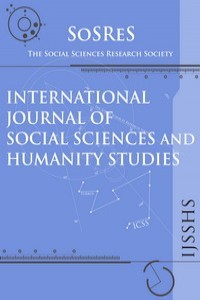A NEW FORM OF SECURITY COOPERATION AND COLLECTIVE CONFLICT MANAGEMENT IN THE POST COLD WAR INTERNATIONAL SYSTEM
A NEW FORM OF SECURITY COOPERATION AND COLLECTIVE CONFLICT MANAGEMENT IN THE POST COLD WAR INTERNATIONAL SYSTEM
conflict management, international organizations, NATO, UN, EU, comprehensive approach security,
___
- Biscop, Sven (2011), “From Lisbon to Lisbon: Squaring the Circle of EU and NATO Future Roles”, EGMONT Security Policy Brief, No.16, pp.1-6.
- Blockmans, Steve and Ramses A. Wessel (2009), “The European Union and Crises Management: Will the Lisbon Treaty Make the EU More Effective?”, Journal of Conflict &Security Law, Vol.14, No.2, pp.265-308.
- Crocker, Cristopher A., Fen Osler Hampson and Pamela Aall (2011),“Collective Conflict Management: a New Formula for Global Peace and Security Cooperation, International Affairs, Vol.87, No.1, pp.39-58.
- Duke, Simon, (2010), “Misplaced “other” and Normative Pretence in Transatlantic Relations”, Journal of Transatlantic Studies, Vol.8, No.1, pp.315- 336.
- Johnson David E. (2011), “What Are You Prepared to Do? NATO and the Strategic Mismatch Between Ends, Ways and Means in Afghanistan-and in the Future”, Studies in Conflict and Terrorism, Vol.34, pp.383-401.
- Koenig, Nicole (2010), “The EU and NATO: Towards a Joint Future in Crisis Management?”, EU Diplomacy Papers, Department of EU International Relations and Diplomacy Studies, Vol.11, pp.1-38.
- Lepgold, Joseph and Thomas G.Weiss (1998), Collective Conflict Management and Changing World Politics, New York. Major, Claudia (2008), “EU-UN Cooperation in Military Crises Management: the Experience of EUFOR RD Congo in 2006”, Institute for Security Studies, September, no.72, pp.1-48.
- Morsust, Claudia (2009), “Effective Multileteralism? EU-UN Cooperation in the DRC, 2003-2006”, International Peacekeeping, Vol.16, No.2, pp.261-272
- Tanner, Fred (2010), “Adressing the Perils of the Peace Operations: Toward a Global Peacekeeping System”, Global Governance, Vol.16, pp.209-217.
- Williams, M.J. (2011), “Empire Lite Revisited: NATO, the Comprehensive Approach and State-Building in Afghanistan”, International Peacekeeping, Vol.18, No.1, pp.64-78.
- Başlangıç: 2009
- Yayıncı: Sosyal Bilimler Araştırmaları Derneği
Mehmet ULUTAŞ, Adnan KALKAN, Özlem ÇETİNKAYA BOZKURT
THE DISTRIBUTION OF ELDERLY POPULATION IN TURKEY AND THE FACTORS EFFECTING THIS DISTRIBUTION
LINE MANAGERS’ ROLE IN CONTINUOUS PROFESSIONAL DEVELOPMENT AND HUMAN RESOURCES
Anubama Ramachandra, Nur Naha Abu Mansor, Norhalimah Idris
FOREIGN CAPITAL INVESTMENTS AND ECONOMIC CRISES IN TURKEY
Mustafa ÖZTÜRK, Osman Nuri ARAS
PROFESSIONAL CONTENTMENT IN A RESEARCH UNIVERSITY: A CASE STUDY
Hamidah Abdul Rahman, Maisarah Mohamed Saat, Azizah Rajab
MERGER AND ACQUISITION IN THE FINANCIAL SERVICES INDUSTRY
A REVIEW ON CONSUMER PERCEPTION OF ORGANICALLY PRODUCED RED MEAT AND MEAT QUALITY
Yalcin BOZKURT, Mevlut GUL, Gulay HIZ
CONSUMERS’ PERCEPTIONS TOWARDS INTERNATIONAL SUPERMARKET PRIVATE BRAND PRODUCTS
May Chen YAP, David Yoon Kin TONG, Kim Piew LAİ
